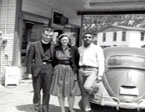Policies
How to Make an Inquiry & General Guidelines
- We welcome inquiries by email, phone, letter, fax, or in person, and we are committed to providing information as quickly as possible. Please keep in mind that we receive many inquiries every week and that we have a small staff. We respond to requests for photocopies or research in the order in which they are received by us.
- Please make your requests as specific as possible. While we make every effort to provide relevant information to those who are unable to visit the Archives to do their own research, the staff cannot undertake extensive research on behalf of individuals. The more focused your request, the better.
- We prefer to send information electronically whenever possible. Please provide an email address. We limit the number of scanned images to 10. Contact us for information about scanning fees.
- Paper photocopies are billed at a rate of 10 cents per page after 10 pages are reached; we have a limit of 100 pages. An invoice is enclosed when the copies are mailed.
- We reserve the right to decline to photocopy or scan fragile documents.
On-site Collection Use
- For your convenience, an appointment is strongly recommended if you are traveling from out of town. We can confirm our hours and have the material you requested ready upon your arrival.
- Items may not be checked out or removed from the Archives reading room.
- You may not bring food or drinks into the reading room
- Archival material is fragile. Please handle our collections with care.
- Do not remove items from a folder or disturb the original order of the documents. Staff will show you how to flag an item for photocopying.
- Use pencil, not pen, if you take handwritten notes.
- Laptops are welcome; wireless is available throughout Preston Library.
Digital Camera and Scanner Use Policy
- As a convenience to researchers, personal cameras and flatbed scanners may be used to make copies of materials in the reading room under certain circumstances. Use must be authorized by staff
- The Archives will deny requests to use a personal camera or scanner if such use may result in unauthorized reproduction of restricted materials, damage to materials, if the materials have already been digitized, or for other reasons in its sole discretion.
- All photographs or images created may be used only for personal research and study and may not be published, distributed on the web, or given to another library, archive, or repository without written permission from the Virginia Military Institute Archives and any relevant copyright holder.
- Researchers must provide their own equipment. The VMI Archives cannot supply batteries, memory cards, or cords. Any audio signal emitted by the camera should be turned off.
- All materials must be handled carefully in a manner that will not damage them. Materials must be kept in the order in which they appear in folders and/or boxes. Nothing may be laid on top of a book, manuscript, or other items. Researchers should never write on, erase marks from, or otherwise alter a book, document, or other item.
- Permission to photograph items for personal research purposes does not imply permission to publish or distribute. Permission to publish, exhibit, perform, broadcast, mount images on the web, or otherwise make the materials available must be applied for separately from the VMI Archives and any relevant copyright holder.
Publishing Materials from our Collections
- Permission to publish items from our collections must be requested in writing (email is fine). Our repository citation is Virginia Military Institute Archives.
- Researchers assume full responsibility for conforming to copyright law.
Collection Development Policy
Our collection development priorities are available here.
.svg)
.png)
